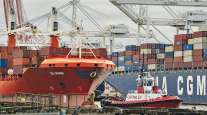Senior Reporter
Congress Eyes Semiconductor Bill, Nominations This Summer
[Stay on top of transportation news: Get TTNews in your inbox.]
Before the August recess, congressional leaders intend to finalize supply chain-centric legislation as senators prepare to vote on nominees for senior roles at the U.S. Department of Transportation.
Speaker Nancy Pelosi (D-Calif.) and Senate Majority Leader Chuck Schumer (D-N.Y.) expressed interest in approving legislation designed to boost domestic manufacturing of semiconductors amid supply chain woes. A bipartisan group of senior lawmakers is negotiating the final terms of the bill.
“It is critical that the Congress act swiftly and decisively to lower families’ costs, energize American manufacturing and strengthen America’s competitiveness now and for the future,” Pelosi and Schumer said following a recent top-level meeting on the bill. “On behalf of House and Senate Democrats, we expressed our belief that there is no reason that we should not pass this bill through Congress in July. Democrats have already made accommodations in the name of reaching an agreement, which we are optimistic can happen soon.”
Pelosi and Schumer emphasized, “This legislation is necessary to help lower costs for the American people by addressing supply chain issues, the chips shortage and more, and we urge all members to work with the urgency the situation deserves.”
Policymakers already gave bipartisan backing to the U.S. Innovation and Competition Act, or USICA, which would seek to enhance programs at the Department of Energy. A final legislative product is likely to dedicate about $50 billion for the semiconductor industry.
Proponents of the bill argue supply chain disruptions have contributed to a decrease in access to semiconductors. The electronic computer chips are instrumental in the commercial transportation sector.
As negotiators plan to resume talks on the bill after the July 4 recess, Republican leaders raised concerns about the likelihood of debating a Democratic-led procedural budget bill. Such legislation, the GOP argued, would impede bipartisan progress related to the semiconductor legislation. A budget bill would require a simple majority to pass in the chamber.
Senate Minority Leader Mitch McConnell (R-Ky.) recently took to social media to share his concerns. “Let me be perfectly clear: there will be no bipartisan USICA as long as Democrats are pursuing a partisan reconciliation bill.”
Let me be perfectly clear: there will be no bipartisan USICA as long as Democrats are pursuing a partisan reconciliation bill. — Leader McConnell (@LeaderMcConnell) June 30, 2022
White House press secretary Karine Jean-Pierre criticized McConnell’s remarks. In a statement on June 30 she said: “The Republican Senate leader is holding hostage a bipartisan package to strengthen American competitiveness versus China, that would yield hundreds of thousands of manufacturing jobs in places like Southern Ohio, Idaho and other states around the country. It would lower the cost of countless products, and end our reliance on imports.”
Meanwhile, Senate leaders are expected to schedule a vote this summer on the committee-backed nomination of Robin Hutcheson to lead the Federal Motor Carrier Safety Administration. The agency’s acting chief told senators she would dedicate resources for enhancing safety initiatives, alleviating supply chain bottlenecks and reviewing technological advancements.

Hutcheson
During her confirmation hearing she also touted the contributions of truck drivers. “Now, more than ever, Americans are acutely tuned in to how our goods get to our homes — from the flour for the bread we eat, the clothes we wear, the bed we sleep in — we all have a better understanding that it probably came on a truck,” she told the Senate Commerce Committee.
Prior to FMCSA, Hutcheson was the director of public works in Minneapolis where she oversaw a division of 1,100 individuals. She also was the transportation director at Salt Lake City.
American Trucking Associations is among the groups pressing senators to confirm the nominee. “Since her appointment as acting administrator in January, Ms. Hutcheson has worked closely with the trucking industry to confront supply chain, workforce and safety challenges, while pressing forward with the implementation of vital programs included in the Infrastructure Investment and Jobs Act,” ATA President Chris Spear said.
The IIJA, or bipartisan infrastructure law, was enacted in November.
Want more news? Listen to today's daily briefing below or go here for more info:




